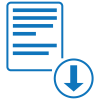Fillable Form Bill Tracker Template
Bill tracking tools allow a user to track the bills, expenses, and their due dates.
Fill and sign Bill Tracker Template online and download in PDF.
What is a Bill Tracker Template?
A bill tracker is a practical tool designed to organize, manage, and monitor financial obligations such as utility bills, subscriptions, rent, and loan payments. It helps individuals and businesses avoid missed payments, minimize late fees, and maintain a clear understanding of their financial commitments.
Using tools like a monthly bill organizer or a bill tracker worksheet allows users to efficiently track monthly bills and plan for future payments with ease. These resources act as a comprehensive budget template where individuals can outline their monthly income, monthly expenses, and business expenses in one place. By utilizing features such as bill calendars, people can gain better visibility into their cash flow, ensuring that all your bills are paid on time. This proactive approach not only helps save money by avoiding late fees but also supports creating a balanced monthly budget that aligns with financial goals. For those looking to simplify their financial planning, a bill tracker becomes an essential aid in managing both personal and business finances strategically.
How do I fill out a Bill Tracker Template?
Get a copy of Bill Tracker Template template in PDF format.
A fillable Bill Tracker Template can be found here. If more space is required, or more details need to be recorded about bills and payments, edit the template and add as many sheets of paper as is necessary.
Month
Enter the month that this page of the bill tracker will be used for.
Bill
Enter a name and/or short description of the Bill.
Due Date
Enter the due date of the bill.
Amount
Enter the amount that must be paid for the bill.
Paid
Enter “Yes” or “No” to indicate if this bill has been paid or not.
Start filling out a Bill Tracker Template sample and export in PDF.
Frequently Asked Questions (FAQs)
What’s the best way to categorize bills?
Categories might include utilities, rent, insurance, subscriptions, and loans.
Can bill trackers integrate with bank accounts?
Many apps allow bank integration for automated tracking and alerts.
How can I track irregular bills?
Add a "frequency" column and track biannual or annual bills like taxes or memberships.
What is a reminder system for a bill tracker?
A reminder system sends alerts (via phone or email) for approaching payment dates.
How can a bill tracker assist with budgeting?
It highlights fixed expenses, helping you allocate money for savings and discretionary spending.
Are there templates for bill trackers?
Yes, free and paid templates are available for Excel and Google Sheets.
How do mobile apps improve bill tracking?
Mobile apps enable on-the-go tracking and automate reminders.
What’s the difference between a bill tracker and a budget planner?
A bill tracker monitors payments, while a budget planner allocates income for various purposes.
How do I deal with overdue bills in a tracker?
Mark them as overdue, calculate late fees, and plan for immediate payment.
What security features should a bill tracker have?
If digital, look for encryption, secure logins, and two-factor authentication.
Can I track payments for multiple accounts?
Yes, add columns for account types or maintain separate trackers per account.
What happens if I lose a manual tracker?
Digitize your tracker or back up manually written data as a precaution.
Can bill tracking affect my credit score?
Timely payments reflected in your bill tracker can help improve your credit score.
What’s a rolling tracker?
A rolling tracker adds upcoming bills for each month, ensuring future visibility.
How do businesses use bill trackers?
Businesses track vendor invoices, rent, subscriptions, and payroll obligations.
Create a Bill Tracker Template document, e-sign, and download as PDF.
















